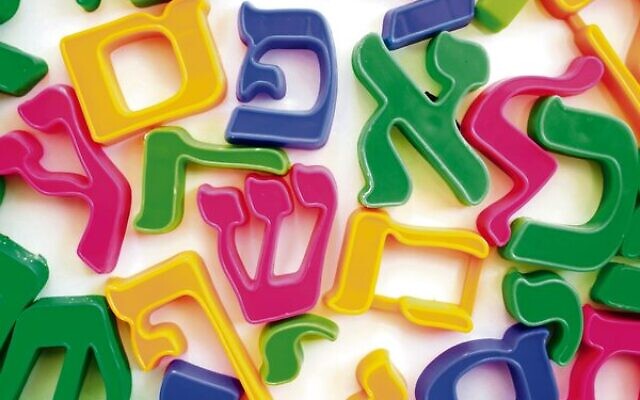‘When speaking Hebrew, I embody Israeli chutzpah and hustle’
'Connecting with Israel through language makes my experience of this conflict from afar more tangible and provides me with a sense of comfort'
For as long as I can remember I have loved Hebrew.
My mother tells me that she would play Shirim Rishonim, classic Hebrew children’s songs, on VHS for me as a pre-schooler. I am in a privileged position to have received a Jewish education and later chose to continue my Hebrew studies as an elective at university in Australia and I spent a summer break at ulpan, a Hebrew intensive course, in Jerusalem. Over the years I further immersed myself in the language in my own time reading Hebrew literature, browsing blogs and watching films to develop my fluency. As a Jew in the Diaspora, my love and use of the Hebrew language provides an additional layer to my sense of self in addition to my love for Israel.
I’m an Australian Jew. My parents were born here and I live in sunny Sydney. However, from the moment I switched on my phone after the October 7 massacre, I’ve felt like I am living through the nightmare with all my Israeli brothers and sisters. While I am far away, I frequently read the Hebrew accounts of the wartime experience of my friends and family in Israel. When I read them in their native tongue, I don’t need to imagine the pain and vulnerability that Israelis are feeling, because the Hebrew flows with raw emotion.
As part of being immersed in Hebrew culture, I follow Israeli influencers and businesses on Instagram. Usually, their content highlights delicious recipes or the hottest restaurant openings. Since the war, however, Chen Koren is no longer posting her beautiful baskets filled with products from Mahane Yehuda, but war diaries detailing her experiences and sharing the miraculous story of her in-laws who survived, despite their home being almost completely burnt down.
Before each Shabbat, heart-warming videos circulate on social media of soldiers singing classic Jewish songs, showing their gratitude for the fresh schnitzels sent to their bases by generous donors, or speaking proudly about ‘winning together’ in our shared language. I’ve even had a couple of laughs at skits from Eretz Nehederet, an Israeli satire show which provides some light relief.
When I attend rallies and services in Sydney, I pray with my community for the State of Israel, the IDF and the release of captives. Saying these words reminds me how important it is that our ancient language was revived and how lucky I am to understand it.
Research has demonstrated that bilinguals express different personalities in different languages, with culture also playing a role. When speaking Hebrew, I embody Israeli chutzpah and hustle. In Israel, having regular conversations with Israelis on the street elevates my experience, while asking someone to get out of my way when they try cut the falafel store queue is more natural in Hebrew and getting through El Al security is a breeze.
Over the past five months Jews around the world have demonstrated that we will not allow what happened in the 1930s to happen again. We are speaking out for the hostages and our country and standing up for what is moral; even if it is in English that Hebrew chutzpah is shining though.
Like Jews around the world, I am in a state of mourning. To comfort myself I’ve compiled a playlist of Hebrew songs that have messages of peace, hope and strength. It contains classics I learnt in school like Am Yisrael Chai and Vehi Sheamda and music relevant to the conflict that I’ve discovered recently, from popular artists such as Omer Adam and Idan Raichel and new artists too. Knowing that Israelis and Diaspora Jews are all listening and singing along to the same lyrics, whether they are sitting in a shelter in Israel or cooking for Shabbat in Sydney, I feel connected to my brothers and sisters around the world.
The reason Hebrew is so important to me right now can be explained by ‘the five-legged table’ concept developed by Avraham Infeld, a leading Jewish educator. He writes about the five elements that make up a Jewish identity, of which you need at least three to have a solid foundation for Jewish life. The Hebrew language is one of the legs and Israel another. Even though Hebrew and Israel are inherently connected, he describes them as are separate elements. Similarly, I can distinguish the value each one provides me. Hebrew provides an additional depth to my identity, particularly when I cannot be in Israel right now.
It’s a difficult time for Jews in the Diaspora. We are facing rising antisemitism locally, while wishing we could provide Israel with more practical support. Connecting with Israel through language makes my experience of this conflict from afar more tangible and provides me with a sense of comfort. Even if you didn’t learn Hebrew in your youth, a simple ‘shalom’ when you bump into an Israeli in your neighbourhood or in a message to a long-lost friend in Israel can go a long way to show them that you care. Perhaps more importantly, it can help you to feel connected to our people and our land.
Tali Feiglin is a doctor and a member of the Sydney Jewish community.


comments